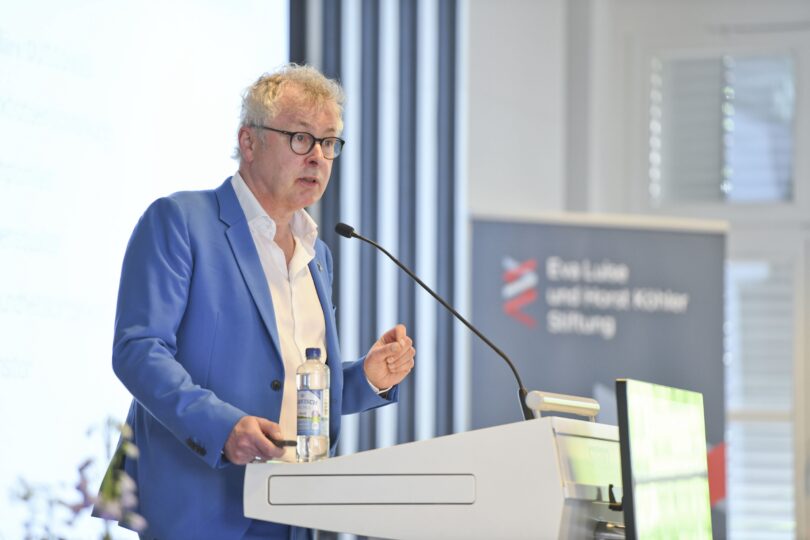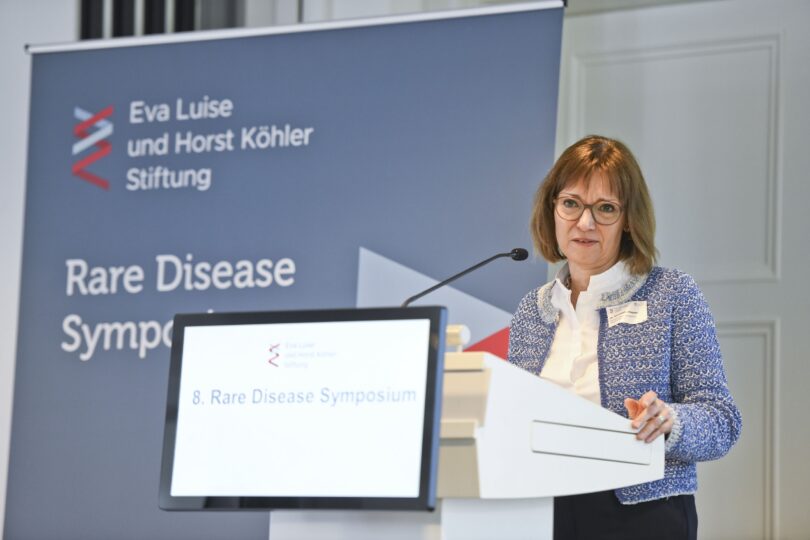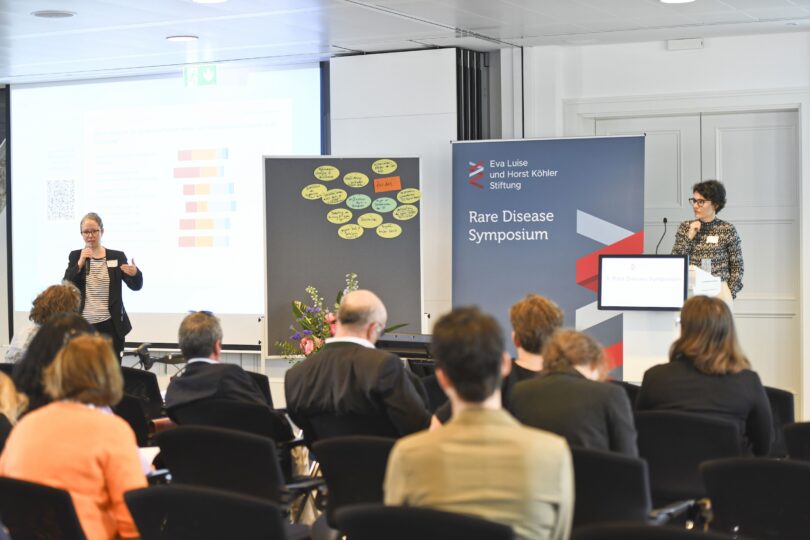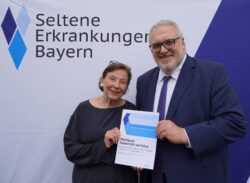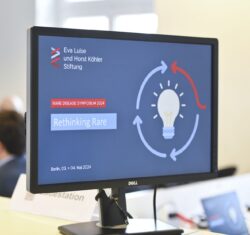Review of Day 1: Saturday, May 3, 2024
Session 4: Facing structural challenges
To start off the second day of the symposium, Dr. Heike Aichinger presented the findings of a report by the Fraunhofer Institute for Systems and Innovation Research (ISI), which was commissioned by the Federal Ministry of Health (BMG). The aim of the study was to examine the current care and living situation of people with rare diseases in Germany and to provide recommendations for the further work of the National Action Alliance for People with Rare Diseases (NAMSE). The study showed progress in diagnostics, coding and the establishment of specialized centers. However, there were clear deficits in primary care and psychosocial support. Eight fields of action with 19 recommendations were identified, including a better database, transparent funding and integrated psychosocial support. In addition to the sustainable financing of the centers and their connection to primary care, the provision and use of digital health solutions are key tasks for the future. Establishing registers appears to be essential here.
Prof. Dr. Boris Zernikow, Vestische Kinder- und Jugendklinik Datteln, then presented the B(e) NAMSE project funded by the Federal Joint Committee’s Innovation Fund. It aims to improve the care of children and adolescents with rare diseases in Germany. As part of B(e) NAMSE, five university hospitals are testing new care pathways, including telemedicine and a structured transition from pediatric/adolescent to adult medicine. The project is being scientifically supported by the University of Witten/Herdecke. The innovation project aims to optimize processes and minimize frictional losses in order to improve the quality of life of the children involved. Accompanied by an evaluation project, B(e) NAMSE is intended to create the basis for a new form of care in the specialist B centers.
In her presentation “Rare diseases – a case for nurse practitioners?”, Dr. Bernadette Klapper from the German Professional Association for Nursing Professions convincingly demonstrated that the German healthcare system is threatened to critical levels by the shortage of skilled nursing staff and is shamefully behind in international comparison, particularly in the area of nursing staff qualifications. Given these conditions, it is not possible for specially trained nursing staff to work in close collaboration with doctors. In her outlined scenarios of networked care by nurse practitioners and community health nurses, numerous problems in the coordination and local provision of services could be overcome. This would be of particular benefit to patients with rare diseases who require special care due to their complex medical conditions.
The fact that care and research on rare diseases are inextricably linked was made clear in the following presentation by Prof. Dr. Tobias E. Huber, UKE Hamburg, on the Research for Rare research network. He highlighted the crucial role of collaborative research networks. These combine expertise, patient registries and clinical studies to overcome challenges such as genetic complexity and limited resources. Using examples, including a clinician scientist program on kidney disease funded by the Else Kröner Fresenius Foundation together with the Eva Luise and Horst Köhler Foundation, Professor Huber demonstrated the successes that are possible through (international) cooperation and close collaboration in improving diagnostic procedures and developing new therapies. His appeal: In order to improve the lives of patients and expand medical knowledge, patient-oriented research must be promoted and expanded in a targeted, political and financially sustainable manner within the framework of international cooperation.
To round off the symposium, participants were invited to share their knowledge and experiences in two interactive workshops:
Workshop 1: “What can and do patients want to contribute to research?
Moderated by Dr. Franziska Krause, Berlin Institute of Health, and Dr. Corinna Klingler, University of Potsdam, this workshop shed light on the self-image and potential of involving patients in research on rare diseases. In the discussion, various ways of participation were highlighted and discussed, such as the provision of valuable data as in the National Register for Rare Diseases or participation in decision-making processes in research projects. Another topic of discussion was also the limits of participation, particularly with regard to resources and representativeness. The intensive discussion showed: Collaboration between researchers and patients is essential in order to gain relevant insights into rare diseases. A structured dialogue and institutionalized forms of cooperation provide an important basis on which patient-oriented research can be successfully advanced.
Workshop 2: “Certification of the Centers for Rare Diseases – Where are we in terms of care?
The workshop was moderated by Prof. Dr. Alexander Münchau, UKSH Lübeck, and Prof. Dr. Annette Grüters-Kieslich, Chairwoman of the Eva Luise and Horst Köhler Foundation. They started by presenting the current status of center certification: There are currently 37 NAMSE A centers in the SE Atlas, 21 of which have already been certified or are in the certification process. These include 7 of the 8 centers that participated in the TRANSLATE-NAMSE project. The aim of the workshop was to check whether there was a need to revise the certification criteria from 2019 in the meantime.
The certification criteria discussed for the NAMSE A centers were
Structures of the centers (statutes, pilots, case conferences, networking with other centers, staffing, cooperation with self-help)
- The participants consider the criteria for assessing structural quality to be appropriate.
Diagnostics and treatment (coordination of diagnostics, provision of special diagnostics, referral, concept of unclear diagnoses, treatment recommendations, orphacoding)
- The participants desire a more precise formulation with regard to cooperation with self-help. It was pointed out that the Orpha codes have not been implemented in the outpatient sector.
Quality requirements according to the regulations of the Federal Joint Committee on the specification of the special tasks of centers
- The participants consider the redundancy with the NAMSE criteria to be impractical and request an explanatory presentation in the criteria.
Effort involved in certification (time, scope, audit, costs)
- Participants perceive certification as time-consuming, but at the same time as helpful in identifying weaknesses. The audit is seen as constructive and patient input in particular is considered important. The costs are considered reasonable.
Conclusion: Overall, there is no need to revise the content of the criteria and the certification process. The Certification Commission will be informed of the need for editorial revision.
Prof. Dr. Grüters-Kieslich and Porf. Dr. Münchau informed us that the certification of the specialist B centers is currently in preparation and can already be requested. As soon as enough auditors are available, the process will begin. It is still unclear how many B centers at one location can be audited at the same time. For the sites of a European Reference Network (ERN), recognition will be possible on a written basis (without an audit). Only criteria that are not part of the ERN certification will be asked for.
The participants requested that the requirements for networking with other centers, cooperation with self-help and the questions on research be formulated precisely.
Read the review of the first day of the event: Review 8th Rare Disease Symposium 1/2
More pictures by photographer Andrea Katheder can be found here: Album 8th Rare Disease Symposium


